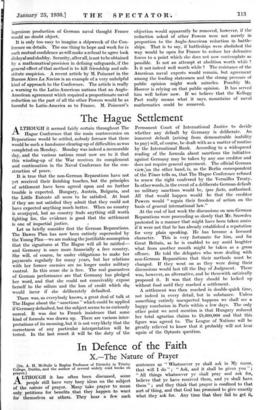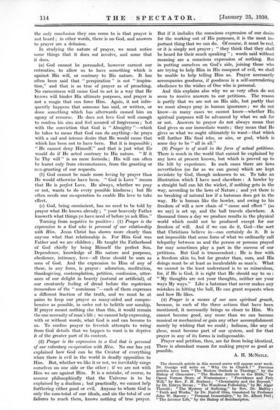In Defence of the Faith
X.—The Nature of Prayer
[Dr. A. H. McNeile is Regius Professor of Divinity in Trinity College, Dublin, and the author of several widely read books on
Prayer-1
ALTHOUGH it has often been discussed, some people still have very hazy ideas on the subject of the nature of prayer. Many take prayer to mean only petitions for benefits that they happen to want for themselves or others. They hear a few such sentences as " Whatsoever ye shall ask in My name, that will I do " ; " Ask, and it shall be given you " ; " All things whatsoever ye shall pray and ask for, believe that ye have received them, and ye shall have them " ; and they think that prayer is confined to that sort of thing, and that God has promised to give exactly what they ask for. Any 'time that they fail to get it, the only conclusion they can come to is that prayer is not heard ; in other words, there is no God, and answers to prayer are a delusion.
In studying the nature of prayer, we must notice some things that it does not involve, and some that it does.
(a) God cannot be persuaded, however earnest our entreaties, to allow us to have something which is against His will, or contrary to His nature. It has often been said that " perspiration " is not " inspira- tion," and that is as true of prayer as of preaching. No earnestness will cause God to act in a way that He ktows will hinder His ultimate purposes, and prayer is not a magic that can force Him. Again, it not infre- quently happens that someone has said, or written, or done something which has afterwards caused him an agony of remorse. He does not love God well enough to confess his sins and feel assured of forgiveness ; but with the conviction that God is " Almighty "—which he takes to mean that God can do anything—he prays with a sad and intense desire that He would cause that which has been not to have been. But it is impossible ; " He cannot deny Himself," and that is just what lie would do if He acted contrary to His nature. " If it be Thy will " is no mere formula ; His will can often be learnt only from circumstances, from the granting or non-granting of our requests.
(b) God cannot be made more loving by prayer than He would otherwise have been. " God is Love " means that He is perfect Love. He always, whether we pray or not, wants to do every possible kindness ; but He often needs our co-operation to enable His love to take effect.
(c) God, being omniscient, has no need to be told by prayer what He knows already ; " your heavenly Father knoweth what things ye have need of before ye ask Him."
Turning from negative to positive : (1) Prayer is the expression to a God who is personal of our relationship with Him. Jesus Christ has shown more clearly than anyone what that relationship is. For Him God was Father and we are children ; He taught the Fatherhood of God chiefly by being Himself the perfect Son. Dependence, knowledge of His nature and purposes, obedience, intimacy, love—all these should be ours as sons of God. And the expression to Him of any of these, in any form, is prayer : adoration, meditation, thanksgiving, contemplation, petition, confession, utter- ance of our delight in beauty (natural or artificial), of our creaturely feeling of dread before the mysterium tremendum of the " numinous "—each of them expresses a different fraction of the truth, and we must be at pains to keep our prayer as many-sided and compre- hensive as possible, in order not to belittle our sonship. If prayer meant nothing else than this, it would remain the one necessity of man's life ; we cannot help expressing, with or without words, what God is and can become to us. To confine prayer to feverish attempts to wring from God details that we happen to want is to deprive it of the greater part of its content.
(2) Prayer is the expression to a God that is personal of our voluntary co-operation with Him. No one has yet explained how God can be the Creator of everything when there is evil in the world in deadly opposition to Him. But, whether we like it or not, we inevitably range ourselves on one side or the other ; if we are not with Him we are against Him. It is a mistake, of course, to assume philosophically that the Universe is to be explained by a dualism ; but practically, we cannot help furthering either good or evil. Anyone to whom God is only the sum-total of our ideals, and sin the total of uur failures to reach them, knows nothing of true prayer. But if it includes the conscious expression of our desire for the working out of His purposes, it is the most im- portant thing that we can do. Of course, it must be real, or it is simply not prayer ; " they think that they shall be heard for their much speaking " ; words said without meaning are a conscious expression of nothing. But in putting ourselves on "God's side, joining those who are trying to help Him in His conquest of evil, we shall be unable to help telling Him so. Prayer necessarily accompanies goodness, if goodness is a self-surrendering obedience to the wishes of One who is personal.
And this explains also why we so very often do not seem to receive answers to our petitions. The reason is partly that we are not on His side, but partly that we must always pray in human ignorance ; we do not know—in many cases we cannot know—whether His spiritual purposes will be advanced by what we ask for or not. Answers to prayer do not always mean that God gives us our immediate wants ; they mean that He gives us what we ought ultimately to want—that which will further His final telos, or aim, or goal, which is some day to be " all in all."
(8) Prayer is of avail in the form of actual petitions. There is much in the world that cannot be explained by any laws at present known, but which is proved up to the hilt by experience. In such cases there are laws nevertheless (so far as we can guess) which are kept inviolate by God, though unknown to us. To take an illustration which I have used elsewhere : A bowler by a straight ball can hit the wicket, if nothing gets in the way, according to the laws of Nature ; and yet there is no breaking of natural law if a batsman does get in the way. He is human like the bowler, and owing to his freedom of will a new chain of " cause and effect " (as we say) is set up, and the ball travels elsewhere. A thousand times a day we produce results in the physical world which could not be produced except for our freedom of will. And if we can do it, God—the sort that Christians believe in—can certainly do it. It is not impossible that some form of what we ordinarily call telepathy between us and the person or persons prayed for may sometimes play a part in the success of our petitions. But God is transcendent ; He is free with a freedom akin to, but far greater than, ours, and His doings must be at least as incalculable as man's. What we cannot in the least understand is to us miraculous, for, if He is God, it is right that He should say to us : " My thoughts are not your thoughts, neither are your ways My ways." Like a batsman that never makes any mistakes in hitting the ball, He can grant requests when and how He likes.
(4) Prayer is a means of our own spiritual growth, because, in each of the three actions that have been mentioned, it necessarily brings us closer to Him. We cannot become good, any more than we can become musical or mechanical or gain any other accomplishment merely by wishing that we could ; holiness, like any of these, must become part of our system, and for that prayer in any of its forms is indispensable.
Prayer and petition, then, are far from being identical. There is abundant reason for making prayer as good as possible.
A. H. MCNEILE.
The eleventh article in this second series will appear next week. Dr. Goudge will write on " Why Go to Church ? ' Previous articles have been " The Modem Outlook in Theology," by the Bishop of Gloucester ; " The Modern Attitude to the Bible," by Canon Vernon Storr, of Westminster ; " Providence and Free Will," by Rev. F. H. Brabant ; " Christianity and the Beyond," by Dr. Edwyn Bevan • " The Wondrous Fellowship," by Mr. Algar
Thorold ; The Mystery of Suffering," by Rev. Dr. Maltby ; " Faith and Works," by Dr. Rudolf Otto, translated by Professor John W. Harvey" Personal Immortality," by Dr. Albert Peel ; " The Interior Life," by the Bishop of Southampton.







































 Previous page
Previous page